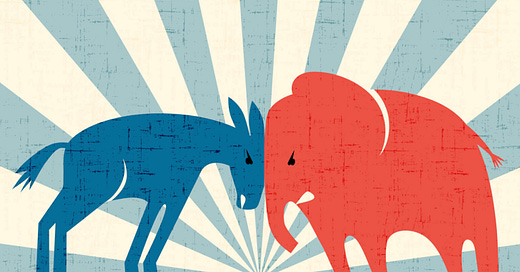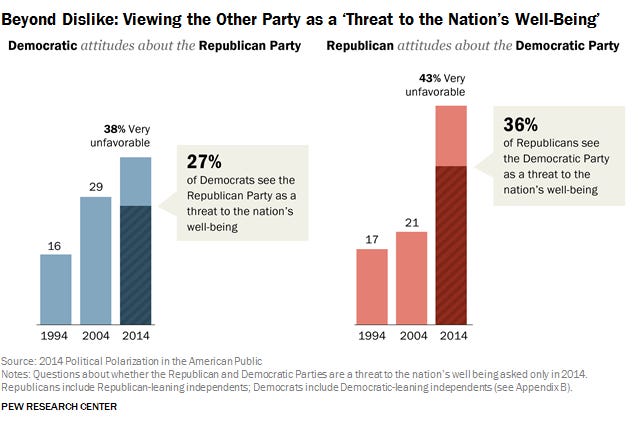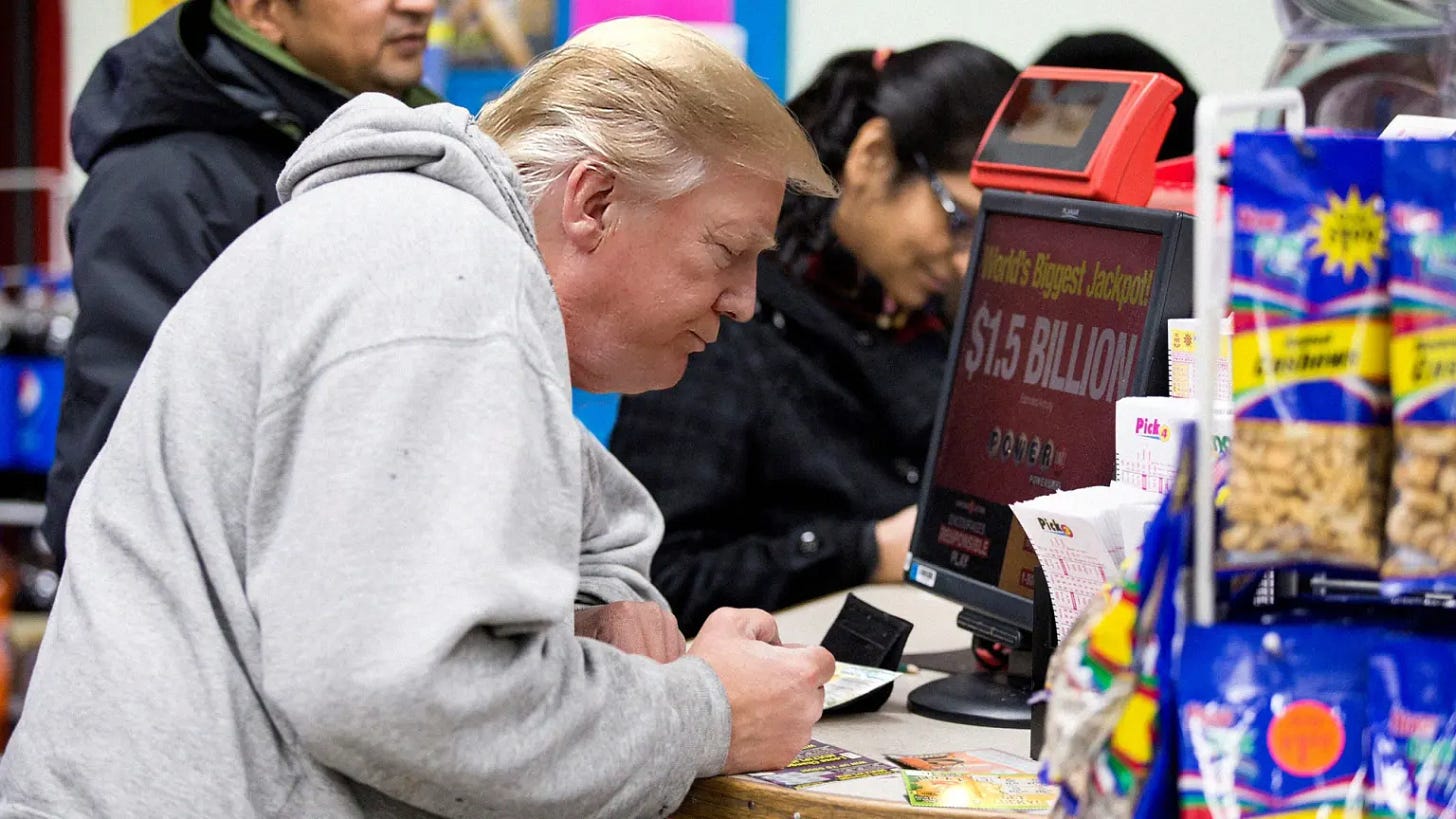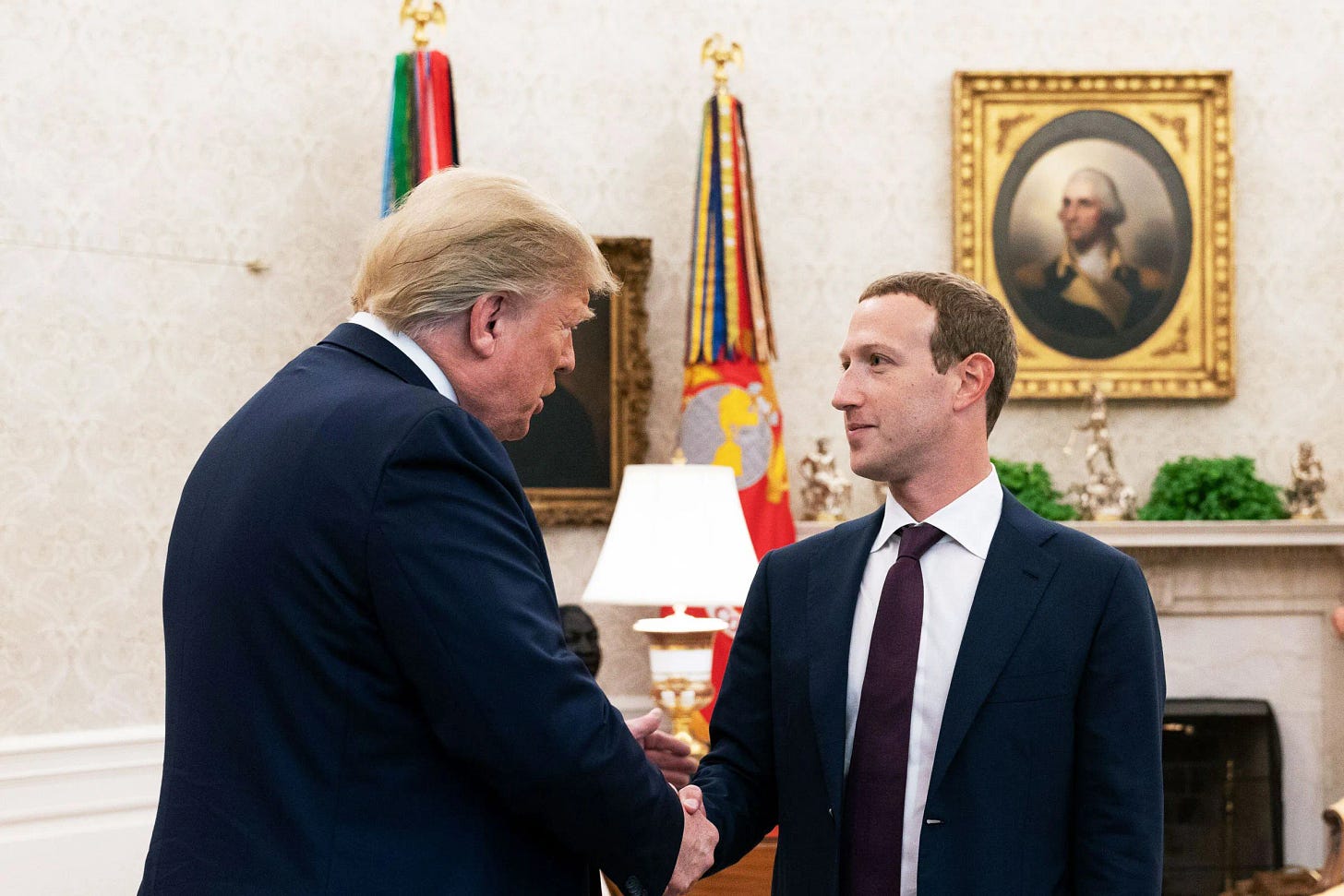The Narcissism Driving Political Polarization
Your political opponents aren’t just wrong anymore, they are EVIL
You haven’t spoken to your cousin in two years. Not since that dinner when politics came up and she called you a commie. Your brother-in-law posts memes mocking "libtards" every morning while drinking his morning coffee. Your neighbor, who used to wave from across the fence, now averts his eyes after seeing your MAGA sign. Your mom is switching churches because the pastor said something critical about Donald Trump.
This isn't normal political disagreement. This is something deeper, uglier, and more dangerous than anything America has seen since the Civil War.
Between 1994 and 2016, something broke inside American politics. The Pew Research Center shows that Americans who held consistently liberal or conservative views doubled from 10% to 21%. The center didn't hold. More troubling, by 2014 over a third of Republicans said the Democratic Party posed a threat to the nation itself. More than a quarter of Democrats said the same about Republicans.
We stopped disagreeing and started demonizing. Your political opponents aren’t just wrong anymore, they are evil.
*Note that this was the trend even BEFORE Trump. Imagine what these numbers are today.
How Splitting Kills Democracy
To understand what's eating American democracy alive, you need to understand a concept psychologists call "splitting." It's the inability to see shades of gray in people or situations. Everything becomes either pristine or rotten, with no messy middle ground.
Splitting is the failure in a person's thinking to bring together both the positive and negative qualities of something into a realistic whole. When someone splits, they think in extremes where an individual's actions are all good or all bad with no middle ground. Most of us do this occasionally when we're stressed or hurt. But for some people, it becomes a way of life.
Central to narcissistic personalities is this polarized perception of events and people into extremes of all-good or all-bad. The narcissist can't tolerate being a mixed package, and can't let anyone else be one either. They see their life as a personal hero’s journey and everyone around them is either someone on their side or someone in their way.
This psychological pattern has infected American politics like a virus. For the narcissist, disagreement or criticism feels like a personal attack on their very self.
Our political discourse is a mirror of what’s happening inside our fractured minds and brittle institutions. When the ability to hold complexity breaks down, so does the ability to govern, compromise, or even talk. The split isn’t just ideological, it’s psychological. Our parties, like our people, are losing the capacity to live in tension with contradiction.
The Messiah Leader (Winning the Lottery)
When people feel scared, confused, or left behind, they often turn to leaders who promise simple answers. That's why figures like Donald Trump and Benjamin Netanyahu hold such appeal for so many. They offer psychological comfort through splitting.
Narcissistic people are six times more likely to buy lottery tickets than the general population. Why? Because they believe they're special, that fate owes them a jackpot, that complex problems have magical solutions. This same craving for simple fixes seeps into politics when voters shop for a messiah who promises to end wars, fix the economy, and restore greatness before the next election cycle.
Trump's narcissism constitutes a large part of his appeal to certain voters. For voters who feel small and helpless in the face of rapid change, who worry about their economic future and social standing, Trump models a simplistic way to vanquish self-doubt and defend against existential anxiety. He shows them how to transform helplessness into righteous indignation, how to blame "stupid politicians" for complex problems, and how to attack critics with contempt rather than engage with difficult realities.
To identify yourself as a Trump supporter helps you feel like a "winner" when you unconsciously fear you're a "loser" in this complicated, unfair world. Underneath political positions is psychological need. When Trump divides the world into "fake news Democrats" versus "the people saving America," he's offering splitting as a solution to anxiety. He's selling lottery tickets for the soul—the fantasy that one strong leader can fix everything that's broken.
“I am your voice. I am your warrior. I am your justice. I am your retribution… Either they win or we win. And if they win, we no longer have a country.”
— Donald Trump, CPAC 2023
Netanyahu operates similarly. Psychological profiles describe him as having "a narcissistic personality with paranoid and authoritarian tendencies." Like Trump, he's mastered the ability to mobilize supporters by offering them a simplified world where they're the heroes and everyone else is either an ally or an enemy, a sympathizer or an anti-Semite. Both leaders excel at what psychologists call "identity entrepreneurship," which means helping their followers feel special and good by association.
Talk is cheap, especially at a rally. Promising to solve Gaza, Ukraine, and inflation in your first month costs nothing but campaign rhetoric. But believing these promises requires the same magical thinking that makes someone buy scratchers at the gas station. The psychology is identical: complex problems have simple solutions and I deserve to win.
Research shows that narcissistic personalities are drawn to Trump specifically because he reflects their own psychological patterns. A narcissistic personality, which is founded on insecurity and a fascination with self-aggrandizement and power, makes people more likely to support him.
The Contagion of Contempt
Here's the thing you need to know: splitting spreads. The impact of this splitting is contagious so that others in a narcissist’s sphere of influence start seeing the world this way too, causing recursive polarization from the Capitol all the way down to your dining room table.
Your family dinner didn’t erupt because of tax policy. It exploded because one person's splitting behavior infected the whole table. When Uncle Dave starts talking about how Democrats are destroying America, he's not making a policy argument, he's modeling a psychological defense mechanism that makes complex problems feel simple, comprehensible, manageable, and solutionable.
Uncle Dave's anxiety about his shrinking pension gets transformed into rage at "welfare queens." His confusion about economic changes he can't control becomes hatred for immigrants "stealing jobs." The messiness of modern life suddenly has villains with faces and names. His world makes sense again, even if that sense is built on fantasy.
But Uncle Dave doesn't stop there. He needs allies in his simplified universe. So he starts recruiting at the dinner table, testing who's willing to join his version of reality. "You agree with me, right?" becomes less a question than a loyalty test. Answer wrong, and you're not just disagreeing, you're betraying the family, the country, everything decent.
This is how narcissistic splitting hijacks entire social groups. One person's psychological need for simple answers becomes everyone's problem. The splitting spreads like emotional wildfire because it offers the comfort of certainty in an uncertain world, and the intoxicating feeling of moral superiority.
The Machine That Makes Monsters
Nowhere is this contagion more visible than on social media. Platforms like Facebook, Instagram, Twitter/X, and TikTok have become splitting laboratories where algorithms designed to maximize engagement actively promote the most divisive content. The data showed that anger and fear kept people scrolling longer than nuance and understanding, so the FB executives fed us a steady diet of outrage to make more ad revenue at the expense of our mental health and social cohesion.
These people don't care about truth or democracy. They care about money and power. And nothing sells like tribal warfare. Your feed becomes a constant stream of the worst possible interpretations of the other side's behavior, carefully curated to keep you angry, afraid and hateful. Every post that makes you furious is a small victory for the algorithm, since it makes it more likely you will follow or comment.
The technology weaponizes splitting. One person's black-and-white thinking gets amplified to millions, each share adding emotional intensity. The platforms reward the most extreme voices while burying measured perspectives in algorithmic obscurity. Your aunt's reasonable, balanced political post gets three likes. The conspiracy theory gets shared 10,000 times.
Geographic sorting makes it worse. Many Americans live in like-minded communities where they never encounter people who disagree with them politically. When you don't know any actual Republicans or Democrats, it's easier to believe they're monsters. Media fragmentation means we're not just getting different opinions about the same facts, we're getting entirely different facts.
This contagion effect explains why political violence has skyrocketed. In February 2021, a fifth of Republicans and 13% of Democrats (over 65 million people) believed immediate violence was justified. When you truly believe the other side is evil, violence stops being unthinkable and starts being necessary.
The numbers are stark. Domestic terrorist attacks and plots against government targets motivated by partisan beliefs in the past five years are nearly triple the number in the previous 25 years combined. White supremacists conducted 67% of terrorist plots in 2020. Anarchist and anti-fascist attacks rose to 20%.
This isn't random chaos. It's the predictable result of a political culture that's embraced splitting as its operating system, amplified by machines programmed to profit from our psychological weaknesses.
When Splitting Becomes Dangerous
Splitting allows narcissistic leaders to do whatever they want to whoever they want and rarely be held accountable. When your side is always good and the other side is always bad, any action becomes justifiable. The psychological research shows that splitting can cause intense psychological distress in the person being devalued and creates volatile emotional states and unpredictable behavior.
Think about what this means in practice. When a leader splits the world into patriots versus traitors, suddenly questioning election results isn't just politics, it's saving democracy. When everything becomes an existential threat, normal guardrails disappear. Lying becomes "strategic communication." Violence becomes "self-defense." Breaking laws becomes "protecting the Constitution."
The followers mirror this psychology. If the other side is truly evil, then any tactic is justified to stop them. Harassment becomes activism. Intimidation becomes patriotism. Death threats become warnings to protect the country. This is how ordinary people convince themselves that extraordinary measures are not just acceptable but necessary.
At a national scale, this translates to political instability and the breakdown of democratic norms. When politicians with narcissistic tendencies grab the spotlight, they chase away more moderate politicians who are capable of negotiating compromises. The loudest voices win, and the loudest voices are often the most psychologically unhealthy.
This creates what researchers call a "selection pressure" toward extremism. Politicians who try to find middle ground get attacked by their own side as traitors or weaklings. Those who refuse to demonize opponents get primaried by candidates willing to embrace splitting. The system rewards the most psychologically unstable voices while punishing anyone trying to hold nuance.
The result is a political class increasingly populated by people who see compromise as betrayal and opponents as enemies. These leaders don't just reflect the splitting in the population, they amplify it, model it, and reward it in others. Democracy becomes a zero-sum war where the only options are total victory or total defeat.
We end up with institutions designed for cooperation being run by people psychologically incapable of it. The damage spreads from the top down, poisoning every level of civic life until even school board meetings become battlegrounds and neighborhood associations split along partisan lines.
Where Do We Go From Here?
This isn't just about politics. It's about whether your children will grow up in a country where neighbors can disagree without becoming enemies. Whether your elderly parents will be safe when they wear the wrong hat to the grocery store or put the wrong bumper sticker on their car. Whether you'll be able to send your kids to school without wondering if some parent's conspiracy theory about vaccines or drag queens will lead to death threats against teachers. Whether you can coach Little League without parents screaming at each other over mask policies. Whether you can attend a city council meeting about potholes without it devolving into accusations of fascism and communism. Whether your kids can have playdates with children whose parents vote differently without it becoming a friendship-ending political litmus test.
The splitting is already in your house. It's in your workplace, your church, your kid's soccer team. Every institution that once helped people bridge differences, from local newspapers to civic organizations, has either collapsed or sold-out to one side of the split. We're not just politically polarized. We're psychologically fractured.
Your cousin who won't speak to you anymore isn't just angry about politics. She's practicing a form of psychological splitting that makes her feel safer in an uncertain world. Your brother-in-law posting angry memes every morning isn't just venting, he's participating in a feedback loop designed to keep him perpetually outraged and engaged.
But there’s hope. Splitting isn't permanent. People can learn to tolerate complexity and ambiguity instead of immediately dividing the world into heroes and villains. Actually interacting with people from different backgrounds reduces prejudice and splitting behavior. The cure for seeing others as monsters is seeing them as human.
The solution starts with you tonight. You can refuse to see your fellow citizens as enemies or idiots, even when they see you that way. You can choose curiosity over contempt when someone says something that makes your blood boil. You can insist on treating your opponents as rational, complex, caring human beings with a story rather than ignorant sheep who've been brainwashed.
This means catching yourself when you feel the urge to split. When your neighbor says something political that horrifies you, try asking them "What experiences led you to that conclusion?" instead of writing them off as irredeemable. When you see a post that makes you furious, consider whether sharing it being light and love to the world or add fuel to the fire of contempt.
The path forward requires emotional regulation and emotional intelligence, not more rational arguments. We need to be able to sit with our pain and uncomfortable feelings without immediately acting on them. It means developing the capacity to understand how someone else might reasonably arrive at different conclusions than you. It can’t make sense that one side of 150,000,000 people is completely correct while the other 150,000,000 people are completely wrong. This is about differences in values and backgrounds not about differences in empathy, morality or intelligence.
Choosing complexity and emotional labor gets harder every day as the algorithms and narcissistic leaders push us toward more splitting, more contempt, more violence. But it's still a choice. Every conversation is a chance to model something different. Every interaction is an opportunity to show that democracy can survive disagreement.
We're standing at a crossroads. We can continue down the path where politics becomes an endless cycle of idealization and demonization, ultimately leading to more violence and democratic breakdown OR we can choose the harder path of psychological maturity, learning to live with complexity and treating our opponents as human beings deserving of basic dignity and respect during debates.
Your family dinners depend on that choice, but so does the stability of the world your children will inherit.
We gasp for air among people who believe they are absolutely right, whether it be in their machines or their ideas. And for all who cannot live without dialogue and the friendship of other human beings, this silence is the end of the world.
— Albert Camus









Great article bringing lots of insight. I’ve always been amazed at how people can be so stuck in their beliefs and politics. One of my favorite things to do is listen to other’s points of view, ask questions, stay curious. I always learn something. It gives me a different perspective. I understand them better. It doesn’t always result in me changing my opinion, but I feel I’ve gained insight. I don’t know everything about everything and so I’m willing to learn. I think a great question to ask when someone is going off on something so emphatically is, “How do you know that to be true?” Said kindly and sincerely. It sometimes stops them in their tracks, because they don’t always know, or they’re just parroting something they’ve heard. I think if we could all stay a little more curious without feeling threatened, we’d have a middle on the graph again. 😉
Excellent in-depth examination and insight. And while I believe narcissism isn’t limited to one political party, I do believe we need to become more curious and discerning and thoughtful as a nation and society. I pray we still can.